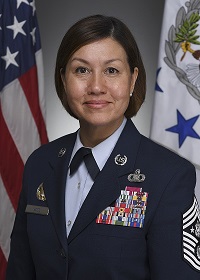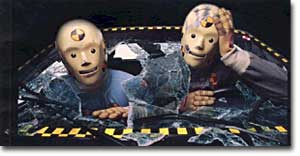8c. Who Are the Bureaucrats?

Chief Master Sergeant of the Air Force Joanne S. Bass represents the changing face of today's bureaucracy, becoming the first woman to serve as the highest-ranking noncommissioned member of a U.S. military service.
The image of the faceless federal employee is completely false.
The 4 million Americans who work for the federal government have many faces and do many jobs. For starters, over 1.4 million are in military service. Overall, they represent much more of a cross section of the American population than do members of Congress or federal judges. About 43% are women, and 28% represent minority groups.
Surprising Facts
Many other misconceptions exist about federal employees. Consider the following:
- Only about 10% of civilian employees work in the Washington, D.C. area. Postal workers and forest rangers live and work across the country, for example. California alone has more federal employees than does the District of Columbia.
- About 30% of the civilian employees work for the army, the navy, the air force, or some other defense agency.
- Even though bureaucrats work at a variety of jobs, most are white-collar workers like secretaries, clerks, lawyers, inspectors, and engineers.
- The number of federal employees per 100 people in the United States population has actually decreased from over 14 per 100 in the early 1970s to a little over 10 per 100 by the late 1990s.

Rangers like this fellow at the Grand Canyon have many duties. Some are responsible for wildlife preservation, others educate visitors about parks and monuments. Park Service employees also work as attendants at buildings like the White House and the Smithsonian museums.
What Do Bureaucrats Do?
Most people think that bureaucrats only follow orders. They carry out the decisions that the President or members of Congress make. Of course, anyone who works in the executive branch is there to implement decisions, but the reality of their work is more complicated. The power of the bureaucracy depends on how much discretionary authority it is granted.
Congress passes laws, but it cannot follow through on all the little decisions that have to be made as the law is translated into action. Bureaucrats, then, may make policies and choose actions that are not spelled out in advance by laws.
Congress delegates substantial authority to administrative agencies in several areas:
- Paying subsidies — government support money — to farmers, veterans, scientists, schools, universities, and hospitals
- Transferring money to state and local governments for grants-in-aid, such as highway building, city improvements, or educational programs.
- Devising and enforcing regulations, such as who owns television stations, what safety features automobiles have, and what kinds of scientific research will be specially encouraged.

Vince and Larry, U.S. Department of Transportation crash test dummies, have been used in ad campaigns encouraging motorists to wear seatbelts and discouraging drunk driving. The Department of Transportation is instrumental in enforcing regulations regarding automobiles, railroads, and aviation.
About 90% of all federal bureaucrats are hired under regulations of the civil service system. Most of them take a written examination administered by the Office of Personnel Management (OPM) and they meet selection criteria, such as training, education levels, or prior experience. Some of them take special tests and meet special criteria, such as postal employees, FBI agents, CIA intelligence officers, foreign-service officers, and doctors in the Public Health Service.
The variety of people who work for the federal bureaucracy is greater than most people realize. They may do scientific research, clerk in welfare offices, decide burn policies for national forests, or do undercover intelligence work. They are all a part of the process whereby the government fulfills the many expectations that Americans have for it today.







